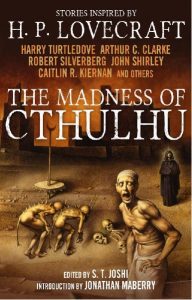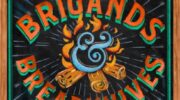 In our usual run down at SFFWorld to Halloween it’s become a bit of a tradition to find ‘this year’s Halloween read’. I do have a pile of trusty favourites here in Hobbit Towers, the ones I can turn to most of the time and are guaranteed to do the job – the Complete HP Lovecraft, the MR James, the odd Stephen King, the David Hartwell Horror collection, The Dark Descent. I do like to try ‘new stuff’ though, and can usually rely on our ‘expert’, Randy M, to come up with at least one new book each year I haven’t tried before. (Actually, it’s usually more than one, but don’t tell him!)
In our usual run down at SFFWorld to Halloween it’s become a bit of a tradition to find ‘this year’s Halloween read’. I do have a pile of trusty favourites here in Hobbit Towers, the ones I can turn to most of the time and are guaranteed to do the job – the Complete HP Lovecraft, the MR James, the odd Stephen King, the David Hartwell Horror collection, The Dark Descent. I do like to try ‘new stuff’ though, and can usually rely on our ‘expert’, Randy M, to come up with at least one new book each year I haven’t tried before. (Actually, it’s usually more than one, but don’t tell him!)
So, to cut a long story short, here’s one I missed in last year’s haul. The thing is, I’m not sure why, for there’s a lot here to like. The book’s been edited by the inestimable expert on things to do with Howard Phillips Lovecraft, S. T. Joshi, which is often a sign of a quality collection for me. It’s mainly all new stories too, ‘inspired’ by the work of HP, so it’s not just a re-moulding of the HPL I’ve got already.
Most surprisingly, it’s got a range of names I recognise (but not for Lovecraft stories), as well as the rather expected few I don’t. The book heralds the appearance of two stories from two very well-known genre authors, who are not known for their horror – Arthur C. Clarke and Robert Silverberg, which should’ve been enough recommendation for me.
To the contents themselves, then. The Foreword is a great start. Written by Jonathan Maberry it tells in a lively, humorous way of how Jonathan was first introduced to HPL’s writing (by amongst others, L. Sprague de Camp!) but then, much more seriously, of the importance of Lovecraft’s work and why it has established an interest, grown a following and now should be recognised not just as a sub-culture but an entire culture of literature.
I would suggest that if you haven’t read the original At the Mountains of Madness tale by HPL then a reread may be needed first to appreciate the collection. Though there may have been copyright issues, in my opinion the book would have benefited from the inclusion of the original tale first, as in the Stephen Jones’ collection Shadows Over Innsmouth, which included HPL’s ‘The Shadow Over Innsmouth’. Much of the original Mountains story, with its shuggoths and Old Ones, has to be known of to appreciate this collection fully, though the Introduction by ST Joshi does concisely summarise HPL’s tale, both in terms of plot and in terms of its importance to horror writing and writers.
Of the new stories, there is a bit more of a mixed bag. Long-time readers of my reviews might have guessed that of most interest to me was a rare Arthur C Clarke tale, the first in the collection. At the Mountains of Murkiness, as you might expect from such a title, is one very much in the mould of his Tales from the White Hart stories, a gently humorous shaggy dog type of tale that you would expect to be told at a bar. Good fun, and worth reading, but not entirely a classic.
The also-mentioned Robert Silverberg is much more satisfying. I was rather expecting this, as Robert has written tales with horrific overtones before, and this one didn’t disappoint. Diana of the Hundred Breasts (yes, really!) is better than its deliberately pulp title might suggest. It is a tale of archaeology and the releasing of something that they shouldn’t. The ending is a little weak, but overall it is a suspenseful tale told well. Not sure why it hasn’t appeared in print more than it has.
Of the authors I have read before, the stories here were as good as I was hoping for. John Shirley, Caitlin R. Kiernan, Harry Turtledove all deserve their places here with their respective tales. Like Sir Arthur’s story, Harry’s The Fillmore Shuggoth was a bit of fun, bringing elements of HPL’s tale into the 1960’s, riffing off the psychedelic rock band H. P. Lovecraft’s performance at the Fillmore in 1968. The thought of ‘Howard Phillips’ and the Old Ones at a rock concert made me grin. Much darker in tone is John Shirley’s The Witness in Darkness, the story of The Mountains of Madness retold from the perspective of the Elder Things. It is magnificent in its emphasis of the science fictional alienness of the original tale and written with a quiet, and rather unsettling, authority. Similarly, Caitlin’s A Mountain Walked echoes the diary format of the original to tell a tale of strange events whilst archaeologically digging in the Wyoming Territory in 1879. (Just in case you haven’t realised – it doesn’t end well.)
Of the rest, I find that in this sort of collection much of the fun is trying a writer you’ve never heard of and are not sure what to expect. I’m very pleased that Heather Graham (not the actress), Melanie Tem, K. M. Tonso, J C Koch, Joseph S Pulver, Jonathan Thomas and Donald Tyson fitted into this category. I would definitely read more by authors Heather and Melanie and K M Tonso again. In particular Heather Graham’s Cthulhu Rising, one of the longer stories in the book, is a strong tale imagined onboard a once mysteriously abandoned, now resurrected, ship in the North Atlantic. Part romance, part Titanic-type tale, the story manages to successfully merge the 1930’s Weird Tales aspects of the Lovecraft stories with an accessible contemporary tone.
However, just as enjoyable was K M Tonso’s Last Rites, which is a great Miskatonic University tale about a descendant of the scientists in those disastrous expeditions to the Antarctic in the original Mountains of Madness novella. Donald Tyson’s The Dog Handler’s Tale was also based upon the original novella and told the events of the original novella from the perspective of one of the Dyer expedition’s few survivors. It was pleasingly appropriate as the final tale in the collection.
Of the other names new to me, Jonathan Thomas’s A Quirk of the Mistral was a nice little story of the finding of a living fossil and the consequences it creates. It was short and didn’t outstay its welcome.
Some worked less well for me. Lois H Gresh’s Devil’s Bathtub was quite slight in comparison with some of the other stories, being basically the short tale of a girl and her pet dog reunited after both have been assimilated into shuggothian ooze. It is effective in its use of language, but in the end left little of an impression.
J C Koch’s Little Lady is a Weird West tale that I really liked, despite having a character named ‘Big Willie’ (which may cause a little amusement). However the reason for this band of desperadoes making the journey they make is never really clear and I became unsure why exactly the characters would unswervingly follow Big Willie to their grisly ends, which made it less successful than I thought it would be.
Joseph S. Pulver’s White Fire is a short tale but as an exercise in channelling a Lovecraftian tale through the spirit of Jack London’s White Fang it was a case of style over substance for me, I’m afraid. Stylish yet unsatisfying.
For those authors I knew little of (and those I did!) there is a useful section about the contributors at the end of the book so that I can read more of their other work.
On balance though, this was a collection with more likes than dislikes. The editing and compiling of such a collection, it has to be said, is down to the work of the editor. In a crowded marketplace, with varying degrees of quality, S T Joshi has, on the whole, managed magic here.
In summary, The Madness of Cthulhu Volume One is a great compilation of tales that would do you well for this year’s Halloween, if you were looking. I rattled through this one in a couple of days and in the end felt that it was actually a bit of a shame that I’ve read it already, before Halloween – but I do have Volume 2 sat nearby for my perusal!
The Madness of Cthulhu, Volume One by various authors.
Edited by ST Joshi, Foreword by Jonathan Maberry.
Published by Titan Books, October 2014
300 pages
ISBN: 978 178 1164 525
Review by Mark Yon, September/October 2015




